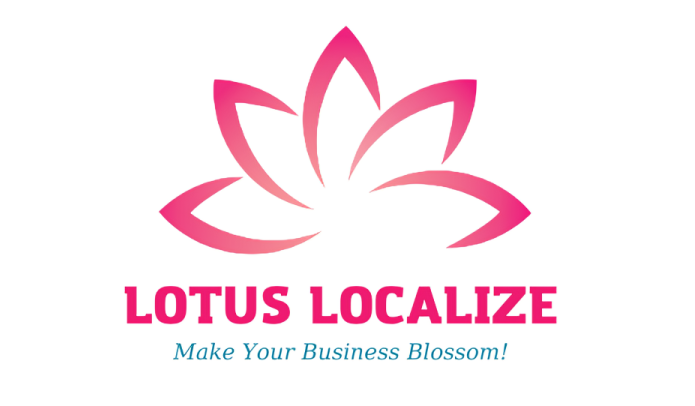Translation service in Hanoi, and Vietnam in general, are among the rapidly growing and attracting fields of interest for many young people when choosing a university and a major. Therefore, the question of how to become a proficient translator is a highly interesting topic to explore.
In this article, let’s join Lotus Localize to understand the basic principles of translation skills to become a professional translator.
1. Learn Specialized Language

Starting with deep learning of both the target and source languages, especially in the specialized field you want to focus on, is the first and fundamental step to becoming a skilled and proficient translator. Unlike ordinary communication languages, professional translation requires translators to have a deep understanding of language, rules for using words, and sentence structures in both the source and target languages.
Therefore, in-depth language study is the first essential condition to become a proficient translator.
Read more: TOP 8 IMPORTANT TRANSLATION SKILLS YOU NEED TO HAVE
2. Master Specialized Knowledge
Translators need to master knowledge in the field they are translating, as it is crucial to ensure accuracy in the translation process. Specialized knowledge helps translators understand the context, specialized terminology, and specific cultural rules related to that field.
This enables accurate and efficient translation, avoiding misunderstandings or errors that may occur. Additionally, a broad understanding of the field helps translators produce high-quality translations, ensuring that the message is conveyed appropriately to the reader.
3. Practice Continuously

Daily practice of translation skills, whether by translating diverse texts from various sources, is extremely important because it helps reinforce and develop translation skills.
Through continuous practice, translators have the opportunity to access various types of texts, expanding their vocabulary and specialized knowledge. Moreover, through practice, they can enhance their analytical skills and gain a deep understanding of context, helping them create accurate translations closely aligned with the original meaning.
Continuous practice also helps translators maintain flexibility and readiness to face various translation challenges. By regularly encountering new texts, they can grasp language and cultural trends, ensuring that translations always reflect the complete and accurate content of the original.
4. Learn About Culture
To become a proficient translator, understanding culture is crucial as it helps translators gain a better understanding of the cultural and social context during translation. Each language and culture has its own characteristics, from expression methods to cultural values. When knowledgeable about culture, translators can easily apply cultural principles and rules to the translation process, ensuring that the translation is not only grammatically accurate but also reflects the accurate cultural meaning and mindset of the target language user.
Additionally, learning about culture helps translators avoid mistakes that may cause cultural misunderstandings or offenses in translation. This is crucial for maintaining good relationships between relevant parties and ensuring that the message is conveyed accurately and respectfully.
Read more: PROFESSIONAL SPORTS TRANSLATION: BRIDGING LANGUAGES IN THE WORLD OF SPORTS
5. Learn How to Use Translation Tools

To become a proficient translator, learning how to use translation tools is crucial because it helps enhance work efficiency and improve the quality of translations. Translation tools are becoming increasingly advanced, providing many useful features such as dictionary lookup, grammar checking, and online translation services, helping translators speed up and improve the translation process.
By using translation tools, translators can save time and effort in information lookup, while also enhancing their ability to handle large and complex texts. However, understanding and using tools effectively is extremely important to avoid translation errors and misunderstandings due to excessive dependence on technology.
Additionally, learning how to use translation tools helps translators stay updated with technological trends and use support tools flexibly and efficiently. This helps them optimize the power of technology to improve the translation process and quickly meet diverse translation requirements.
6. Build Networks and Gain Experience
Building networks and accumulating experience are crucial because they help translators expand opportunities, enhance knowledge, and learn from experienced individuals in the industry. Through networking, they can connect with experts and colleagues in the translation field, enabling them to learn and share knowledge and experience, as well as receive support and encouragement from the community.
Moreover, accumulating experience by participating in real translation projects helps translators develop skills and gain a deeper understanding of the professional translation process. Through each project, they have the opportunity to face challenges and learn effective problem-solving, enhancing their ability to work independently and solve problems.
In summary, building networks and gaining experience help translators not only expand opportunities in the industry but also develop specialized skills and knowledge. This contributes to creating a sustainable and successful translation career.
Through this article, we hope that Lotus Localize has provided you with useful information about translation skills. If you encounter any difficulties or have any questions in finding and using translation services, please contact Lotus Localize at the hotline: 0866 224 968 for the best advice!
Let Lotus Localize accompany you in conquering the world, bringing Vietnamese products, Vietnamese people, and Vietnamese culture to the international stage, and creating miracles!
LOTUS LOCALIZE – MAKE YOUR BUSINESS BLOSSOM!
















